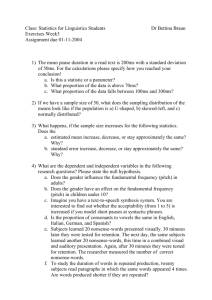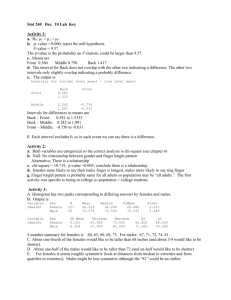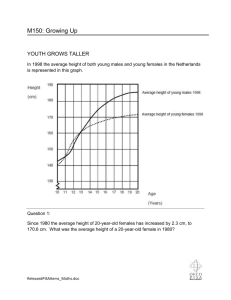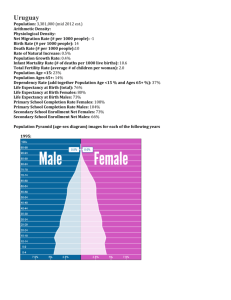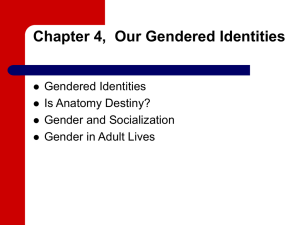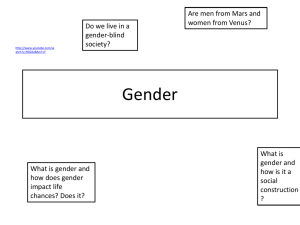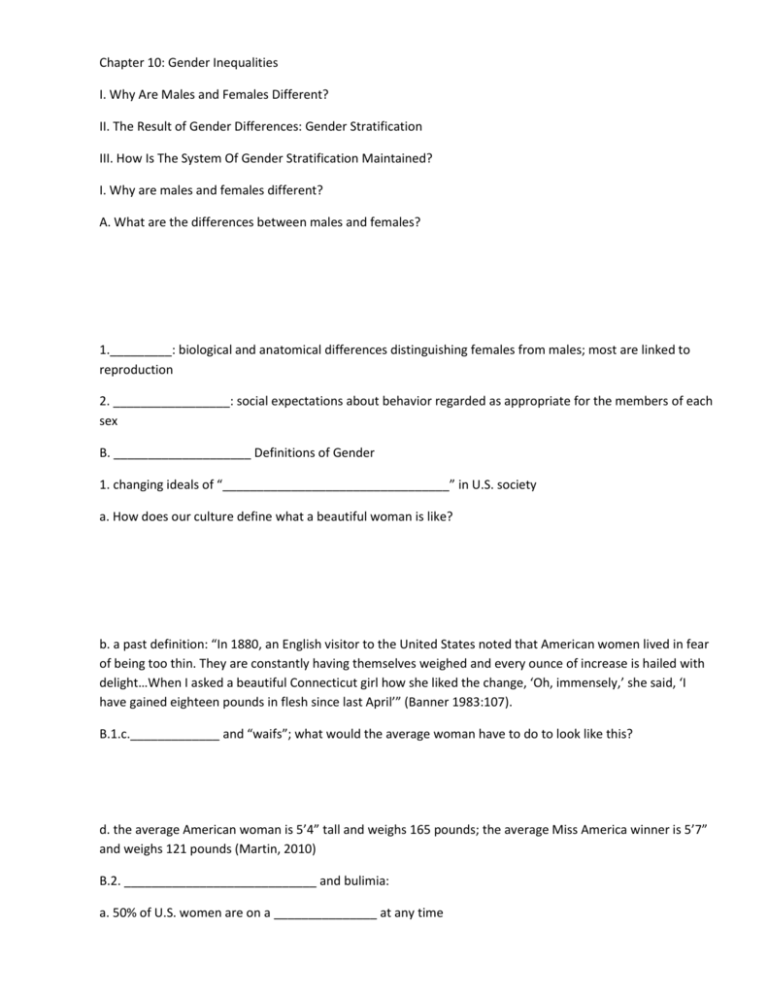
Chapter 10: Gender Inequalities
I. Why Are Males and Females Different?
II. The Result of Gender Differences: Gender Stratification
III. How Is The System Of Gender Stratification Maintained?
I. Why are males and females different?
A. What are the differences between males and females?
1._________: biological and anatomical differences distinguishing females from males; most are linked to
reproduction
2. _________________: social expectations about behavior regarded as appropriate for the members of each
sex
B. ____________________ Definitions of Gender
1. changing ideals of “_________________________________” in U.S. society
a. How does our culture define what a beautiful woman is like?
b. a past definition: “In 1880, an English visitor to the United States noted that American women lived in fear
of being too thin. They are constantly having themselves weighed and every ounce of increase is hailed with
delight…When I asked a beautiful Connecticut girl how she liked the change, ‘Oh, immensely,’ she said, ‘I
have gained eighteen pounds in flesh since last April’” (Banner 1983:107).
B.1.c._____________ and “waifs”; what would the average woman have to do to look like this?
d. the average American woman is 5’4” tall and weighs 165 pounds; the average Miss America winner is 5’7”
and weighs 121 pounds (Martin, 2010)
B.2. ____________________________ and bulimia:
a. 50% of U.S. women are on a _______________ at any time
b. girls as young as ____________________________ report “being on a diet”
c. 10% of all U.S. women and 20% of female college students have ____________________________
B.3. steroid use: male “_____________________________________”
a. one million U.S. males, mainly _______________________
4. Why do Americans do these damaging things to ourselves?
a. the __________________________________________ in our culture of what is appropriate for men and
women shape our behavior in many ways
C. Only a few differences between men and women are _______________________________
1. __________________________________ testing:
a. males are more ___________________ and perform better on visual-spatial tasks and mathematics
b. women perform better on _______________________________
C.2. few differences before ________________________, but combination of biological changes and learning
new behaviors and attitudes during adolescence create differences
3. Strength and speed: female athletes routinely surpass _____________________________ a few decades
old; differences between genders are smaller than the variation in performance within each gender
D. Why is gender an important social fact?
1. in nearly every culture, there are very _______________________________ for each gender
2. in nearly every culture, traits defined as __________________________ are more highly valued than those
defined as feminine
3. we learn these roles and values during our ____________________
II. The Result of Gender Differences: Gender ______________________
A. _______________________: almost all known societies have been a patriarchy: the dominance of men
over women
B. The Result is a System of Gender ____________________________: the inequality between men and
women in terms of wealth, income and status; men’s and women’s unequal access to power, prestige, and
property on the basis of their gender
B.1. Since the world is equally divided between men and women, how does a system that favors men over
women get maintained over time?
C. Gender-Based ________________________________
1. is ___________________
2. is nevertheless still very _____________________
3. If it is illegal, how do we know it still exists?
D. _____________________________________: women holding occupations of lower status and pay and
men holding jobs of higher status and pay
1. Gender & Occupational Segregation
Occupation
Percent Female
Secretary
96.1%
Dental Hygienist
98.3%
Waiter/Waitress
70.4%
Firefighter
3.5%
Truck Driver
6.2%
Airplane Pilot
5.5%
Brickmason
0.7%
Source: Bureau of Labor Statistics for 2013
E. Women’s and Men’s Pay: women earn 77-82% of what men earn on average
Median Annual Earnings by Education
Education
Male
Female
Associate
$48,000
$36,576
Bachelor’s
$61,404
$45,000
Advanced
$80,000
$60,000
Source U.S. Census Bureau Survey of Income and Program Participation 2008
F. ___________________________: a promotion barrier that prevents a woman’s upward mobility within an
organization; unofficial and often invisible barriers to the upper levels of management
1. few women become ___________________________________, law firm partners, or other high ranking
positions due to gender discrimination
2. women are ___________% of the CEO’s at Fortune 500 companies in the U.S.
G. _________________________________: the making of unwanted sexual advances by one person toward
another, in which the first person persists even though it is clear that the other party is resistant; abuse of
one’s occupational position of authority to force unwanted sexual demands on someone
1. often difficult to _________________: “he said, she said”
G.2. also occurs in _____________________________, including classroom jokes and examples and, most
seriously, sexual advances by professors to students over whom they have power via grades or jobs
3. sometimes considered a “___________________” by some professors: examples
4. Turn them in; otherwise, they’ll only harass somebody else
H. Gender and ____________________
1. employers discriminate against women with ______________________, fearing that children will interfere
with a woman’s work life
2. employers _________________________ about family status in interviews, but many violate the law
H.3. Three Strategies to _____________________________ about Family Status during Interviews:
a. _____________________________ strategy: during a break, a low-level employee asks what kind of health
insurance the interviewee wants
b. ______________________________ strategy: encouraging interviewee to talk about problems of being a
working mother
c. __________________________________: openly and illegally ask about family status
III. HOW IS THE SYSTEM OF GENDER STRATIFICATION MAINTAINED?
A. Gender Socialization in the __________________
1. pink and blue ______________
2. __________________________: “Drive-In Movies and Dashboard Lights”
B. _____________________: a key mechanism for maintaining gender stratification
1. ___________________ interact more with boys than girls
2. teachers helped boys work out problems and ______________________ them more than they did girls
C. The ___________________________:
1. Video on Mexico and the Philippines showing _________________________ in factories
2. discrimination in __________________________________
D. Prospects for the Future
1. laws and changing cultural values are ________________________ gender discrimination
2. What else could be done?





